Review| Mission Impossible: Ghost Protocol
I dislike Tom Cruise. Not Top Gun Tom Cruise, but the Tom Cruise of late; the couch-jumping, creepy-interviewing guy who plays “intense Tom Cruise” in every movie. It’s the reason why I decided not to go see Mission: Impossible III during its theatrical run (that and M:I:2 was a let-down).
What got me to see Mission: Impossible – Ghost Protocol was the director. I’m a big fan of Brad Bird’s animated directorial efforts (The Iron Giant and The Incredibles) and I wanted to see how well his style translated to live action, and with a story he didn’t write to boot.
Well, the transition was seamless! Brad Bird has made a fun and entertaining film. Mission: Impossible – Ghost Protocol is, by far, the best installment in the series. Four movies in, this franchise finally understands what it is and embraces it wholeheartedly.
The film’s narrative contains interesting themes, and two jumped out at me quite a lot while watching. The motive of the villain reflected man’s sinful arrogance in deciding what is he thinks is good and evil. And to face off against this evil is a group of good people that have their backs against the wall – a well-worn narrative that reminds us of how God uses the underdog to accomplish the impossible.
Your mission awaits…SPOILERS AHEAD!
Brad Bird is a very good live-action director. I could see in most scenes that he worked well with the actors. His fingerprints were all over the little nuances and character moments that made the team more human and the plot believable, despite its outlandishness.Bird also worked the vistas into the visual narrative, with shots that described without words the harrowing challenges involved. The camera weaves effortlessly through space, recalling the visual freedom of Bird’s animation background. The scenes are as tight and finely crafted as can be. I can remember a few times squirming in my seat because I couldn’t take the suspense. My wife had bitten all of her nails off by the end of the film, which is her gauge that it’s a good movie.
The set pieces in this film were astounding. The Burj Khalifa sequence was harrowing and creatively shot. Bird shot it in such a way that I felt a little fear of heights in me. I remember seeing this film in IMAX in theaters and it just made the scene more intense. The final battle in the Mumbai parking garage was also very interesting visually. I had never seen anything like it before.
 Once again, Michael Giacchino delivers an outstanding musical score. J.J. Abrams brought him in for Mission: Impossible III, and I’m glad he stuck around for the next installment. Giacchino works well with Bird and understands the director’s sensibilities. His specialty seems to be reflecting on mid-century style, which is perfect for the Mission: Impossible films, having been based on a 1960s TV series with a decidedly 1960s theme song. Whereas M:I:2 tried to shed that mid-century tone in music, M:I:III, as well as Ghost Protocol, embraced it.
Once again, Michael Giacchino delivers an outstanding musical score. J.J. Abrams brought him in for Mission: Impossible III, and I’m glad he stuck around for the next installment. Giacchino works well with Bird and understands the director’s sensibilities. His specialty seems to be reflecting on mid-century style, which is perfect for the Mission: Impossible films, having been based on a 1960s TV series with a decidedly 1960s theme song. Whereas M:I:2 tried to shed that mid-century tone in music, M:I:III, as well as Ghost Protocol, embraced it.
The team dynamic was fantastic. At first glance, I thought there wasn’t enough development with the characters. But I then realized that that was part of the point. This wayward group was thrown together in haste, and the stakes are high that they succeed. They do not have time to kick back and reflect. I also appreciated the humorous moments that relieved some of the tension.
And in all honesty, even Tom Cruise didn’t really bother me that much. He was even charming in some scenes. Perhaps Bird is one of those few directors who knows how to properly use an actor’s strong suit (a la James Cameron’s work with Arnold Schwarzenegger in the first two Terminator films).
The Not-So-Good
Though most of the visual effects were very good and very clever, there were some shots that were not very convincing. The bombing of the Kremlin was a particularly bad shot. The computer-generated smoke made my eyes roll.
The “preview” aspect of the title sequence bothered me. They pretty much gave away the entire movie in those first few seconds. Seemed kind of desperate. Did they think they needed to show us all the set pieces so that we wouldn’t leave? I realize, however, that it is a nod to the opening sequence of the television series, but it just doesn’t work for a film.
Cruise’s running scenes made me laugh, literally. His face looked so intense; I thought he was going to have a conniption. The sequence leading up to the sandstorm was hilarious.
Themes and Thoughts
Upon re-watching this film, two big spiritual themes came to my mind.
“‘You will not certainly die,’ the serpent said to the woman. ‘For God knows that when you eat from it your eyes will be opened and you will be like God, knowing good and evil.'” -Genesis 3:4-5
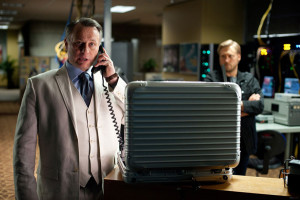 The first theme involved the motivations of the villain, Kurt Hendricks (codename “Cobalt”). Hendricks was an interesting and surprising villain for a mainstream Hollywood film. He wasn’t the insipid, greedy industrialist bent on world domination or the stock rogue agent fed up with “the system.” He was an intellectual – a misanthropic Darwinian environmental extremist bent on making a “peaceful world” via the destruction of a sizable chunk of the human race.
The first theme involved the motivations of the villain, Kurt Hendricks (codename “Cobalt”). Hendricks was an interesting and surprising villain for a mainstream Hollywood film. He wasn’t the insipid, greedy industrialist bent on world domination or the stock rogue agent fed up with “the system.” He was an intellectual – a misanthropic Darwinian environmental extremist bent on making a “peaceful world” via the destruction of a sizable chunk of the human race.
Hendricks thought himself above the rest of humanity, and capable of deciding the fate of potentially billions of people. He was as righteous as a Hitler or a communist commissar in justifying mass murder for the sake of the “greater good.” This way of thinking has reared its ugly head throughout human history, a direct result of the sinful arrogance of man. There have even been books written about how to control populations, though not with such extreme methods as nuclear weapons. Evil is much more subtle than that.
All evil needs is a small sliver of a thought to take hold. In the Garden of Eden, the serpent gave Eve a glimpse into an alternative life apart from God, where she knows as much as God. Hendricks goes beyond such thoughts and attempts to redefine what good and evil are, simply because he thinks he, as a “learned” human being, has the power to do so. In his mind, killing millions is not evil because it is done for “good” reasons. In the end, Hendricks thought this idea was worth dying for and killed himself in order to keep Ethan Hunt from stopping him.
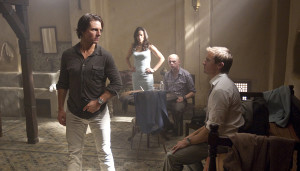 Going up against this evil was a slap-dashed team of agents of the Impossible Missions Force – a small group of people thrown together to accomplish a goal despite the seemingly insurmountable odds. In fact, the entire Mission: Impossible franchise is predicated on a small team accomplishing what look like impossible goals (it’s in the title, after all). Though in this particular installment, the IMF has been disavowed and there was no support coming.
Going up against this evil was a slap-dashed team of agents of the Impossible Missions Force – a small group of people thrown together to accomplish a goal despite the seemingly insurmountable odds. In fact, the entire Mission: Impossible franchise is predicated on a small team accomplishing what look like impossible goals (it’s in the title, after all). Though in this particular installment, the IMF has been disavowed and there was no support coming.
This concept is a narrative device found in many stories. It gives the audience someone to root for, because deep down, we all love an underdog.
“Jesus looked at them and said, ‘With man, this is impossible. But with God, all things are possible.'” -Matthew 19:26
Many of the stories in the Bible are about people facing their own seemingly impossible missions – be it a group of former slaves being pursued by an army, a small boy going up against a giant, a short man rebuilding a wall, or even saving the world from its own sin. The difference between the people in the bible and the IMF team is that the former relied on God for their way out of the situation. Their faith in God enabled them to look past fear and doubt, and do what they needed to do. God makes the impossible possible.
Mission: Impossible – Ghost Protocol, Brad Bird’s live-action directorial debut, is excellent. It shows Bird’s mastery of visual storytelling goes beyond animation (which makes Tomorrowland even more perplexing). It’s a fun and clever film in its execution, and has a decent plot that kept me engaged. It even made Tom Cruise appealing to me…at least for this one film.
Ghost Protocol brought up some great themes related to man’s sinful nature and the goodness of God. The sin of pride can consume a man, making him believe himself to be above God. From there, he can decide what is good or evil, and all manner of bad stems from it. However, God will often appoint people who may look small and ineffectual, but with great faith can accomplish the impossible.
It’s a reminder that we as Christians have our own mission (should we choose to accept it): to have faith that God will come through as He always does, understanding that it may not be in a manner we want, but it is always for our good. He has conquered sin itself, and saved us all through His Son. The least we can do is believe that He is faithful enough to care for us through what may seem to be impossible circumstances in our lives.


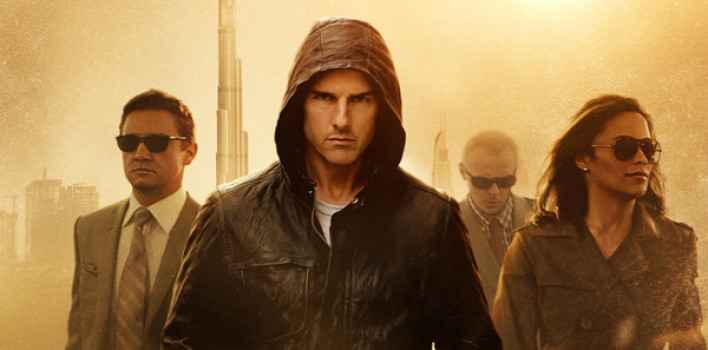
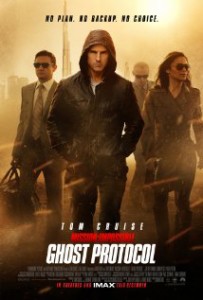
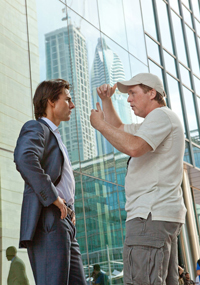

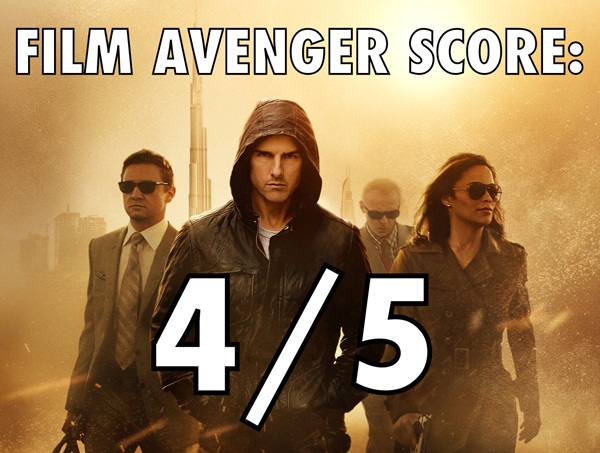

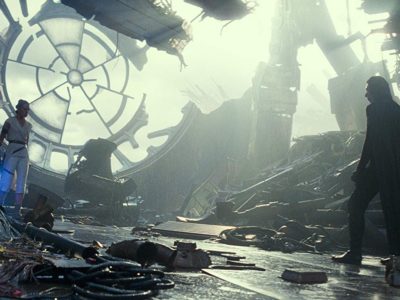



Pingback: In Theaters July 31st, 2015 | Reel World Theology